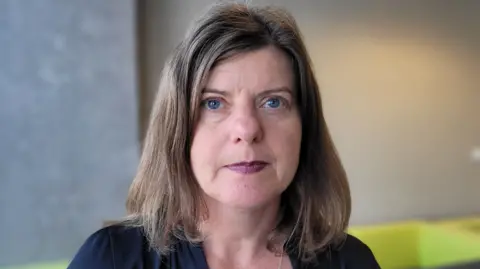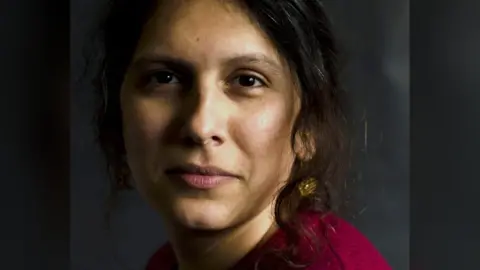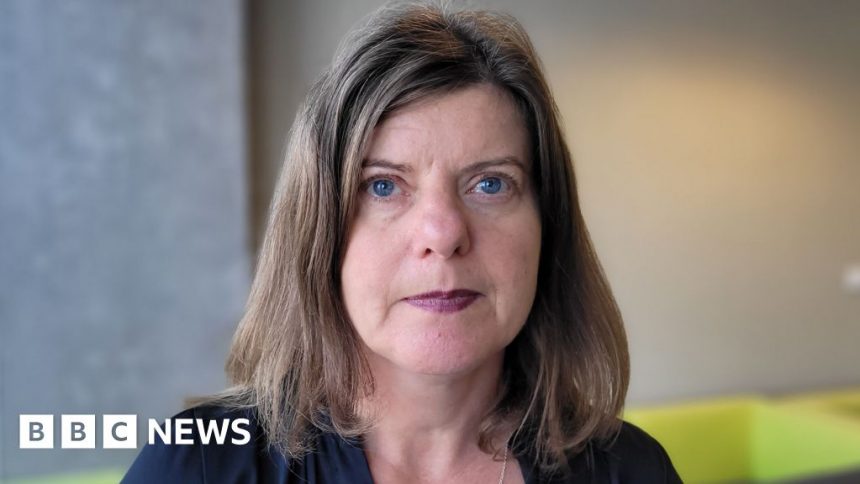Charity boss apologises to rape survivors over support centre failings
 BBC
BBCA charity chief executive has apologised “unreservedly” to rape survivors affected by failings at support centre in Edinburgh.
Edinburgh Rape Crisis Centre came under fire when a review found it had failed to provide women-only spaces for 16 months, and that its CEO – trans woman Mridul Wadhwa – had not acted professionally or understood the limits of her authority.
Sandy Brindley, of Rape Crisis Scotland, said she found out the centre was not following national standards last October and paused referrals 11 months later when the review said safeguarding was a problem.
She told BBC Scotland’s Drivetime programme there was no reason why transgender people could not work in rape support centres, but that services must also provide women-only spaces.
Ms Brindley stressed that Rape Crisis Scotland, which is the national charity that sets service standards for member centres, had no involvement in hiring Ms Wadhwa – who stood down from her role after the review of the Edinburgh Rape Crisis Centre (ERCC) was published last week.
However she said there had been “no reason” not to agree with the appointment at the time as Ms Wadhwa had significant experience of working in the sector.
The role Ms Wadhwa had is reserved for women only – which under recent guidance from the Equality and Human Rights Commission includes trans women who have a gender recognition certificate.
Ms Wadhwa took over the ERCC in 2021 – before this guidance was updated.
Acknowledging that Ms Wadhwa’s appointment had been controversial, Ms Brindley said: “I was not involved in that appointment or that decision. But what I would say is that most rape crisis centres in Scotland provide support to men, women, trans people and non-binary people.
“There is no inherent reason within that, that you could have a trans person working within a rape crisis centre.
“I think what is crucial however, is that if you do have a rape crisis service, that is supporting all survivors is that there’s dedicated women-only spaces within that.”
Ms Brindley added she “absolutely recognised” that women-only spaces were a priority for many women using rape support services.
 Edinburgh Rape Crisis Centre
Edinburgh Rape Crisis CentreMs Wadhwa arrived in the UK in 2002 while living as a woman in her native India. Her passport said she was female. She has been been working in the the violence against women and equality sectors in Scotland since 2005.
She has previously tried to stand for election for the SNP but was not selected as a candidate and later joined the Scottish Greens.
In an interview with The Ferret news service, she said that coverage of claims she was “legally male” had unleashed “a host of hate” and that the focus on having a gender recognition certificate was racist as well as transphobic because it failed to take in Indian cultural norms.
In an interview with the Guilty Feminist podcast in the same year, Ms Wadwha was asked about rape survivors who might be uncomfortable with the presence of trans women in spaces such as rape crisis centres.
In her response, she said that “sexual violence can happen to bigoted people too” and that if rape victims hold “unacceptable beliefs that are discriminatory in nature we will begin to work with you on your journey of recovery from trauma”.
Controversy arose around the Edinburgh centre when an employment tribunal found in May of this year that a counsellor – Roz Adams – had been unfairly constructively dismissed over her belief that people who used the service should be able to know the sex of the staff that would be dealing with their case.
Ms Wadhwa was highlighted in the tribunal outcome as she appeared to believe that Ms Adams was transphobic.
Rape Crisis Scotland then commissioned legal consultant Vicky Ling to review the Edinburgh service.
Ms Ling found that the centre had failed to protect women-only spaces for 16 months and that Ms Wadhwa “did not understand the limits on her role’s authority, when to refer decisions to trustees and failed to set professional standards of behaviour”.
The report also said there was “evidence that the actions of some ERCC staff had caused damage to some survivors”, and that concerns had been raised that some women were “excluding themselves from approaching Rape Crisis Centres including ERCC” because of their aproach to gender identity.
Ms Ling also said she had been made aware that some professionals had heard that “some survivors did not feel safe using the centre”.
After the report was published, Rape Crisis Scotland said it would pause referrals to ERCC – though people can still self-refer – until it was happy the review recommendations had been put in place.
Ms Brindley said she knew nothing of issues at the centre until October last year.
She said she then advised the ERCC board to settle the case rather than proceeding with the employment tribunal and acknowledged she should have been aware of the conflict sooner
Ms Brindley added there had been “significant failures” at the ERCC and she hoped to introduce a “robust framework of assessment” to make sure the national standards are followed and that women-only spaces are provided in future.
Groups including For Women Scotland, which has campaigned against changes to transgender rights, have accused the ERCC board of “ignoring its own culpability”.
The BBC understands Ms Brindley has the full support of Rape Crisis Scotland’s board to stay in post despite Conservative MSP Sue Webber calling for her to quit.
Ms Brindley said the controversy had led to rape survivors who supported the charity experiencing “horrendous” abuse online, including being told that they “must be lying” about being raped.
“It is absolutely astonishing to me that this is the position we’re in where rape survivors can be treated in this way in the name of women’s rights supposedly,” said Ms Brindley.
“I think the onus is on me as chief executive of Rape Crisis Scotland and on the rape crisis movement to try and move to a place where Rape Crisis is not being weaponised in the way it has.”
She stressed that rape survivors could rely on the charity and that it would meet their needs.
Ms Brindley also addressed the comments made by Ms Wadhwa in the podcast, saying: “I do not think the word ‘bigot’ and ‘rape survivor’ should be used in the same sentence.
“When that podcast came out, Mridul assured us that her comments had been taken out of context – that she hadn’t intended them to refer to rape survivors that wanted a single-sex service.”






